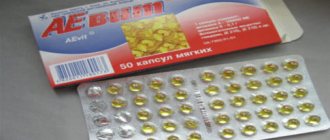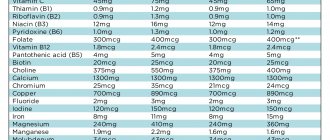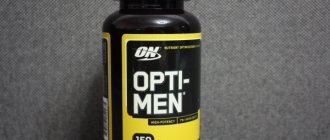Vitamins - how often do each of us use them throughout our lives? But how often do we think about why they are needed and how they affect the human body?
Lack of vitamins initially leads to vitamin deficiency. Subsequently, especially when the shortage lasts a long time, the general condition worsens and both chronic diseases and acute forms of diseases begin to develop.
What are vitamins for?
In order for the body to function fully - metabolism works, all cells are renewed, optimal energy levels are maintained - you need a constant daily supply of vitamins to the body.
Under natural conditions, they come with food. But the modern lifestyle, intense rhythm, inadequate and poor-quality nutrition lead to the fact that humanity is forced to include vitamin complexes in its diet.
But you need to consciously introduce vitamins into your diet, understanding that each of them is responsible for certain functions.
For example, a lack of certain vitamins leads to impairment of the cognitive functions of the human brain and, in particular, memory.
But here we also need to take into account that memory problems in children and adults have completely different causes.
Therefore, eliminating them requires completely different solutions. And you need to be aware of this in order to make the right decision.
AT 6
Thanks to this vitamin, the body produces substances such as gamma-aminobutyric acid, acetylcholine, dopamine, as well as adrenaline and norepinephrine.
All these substances are very important in the functioning of the brain. Without them, or rather at a low level, various cognitive impairments will be observed.
In addition, stress will negatively affect a person’s psycho-emotional state. In addition, B6 deficiency leads to symptoms such as fatigue, confusion and memory loss.
AT 12
Vitamin that improves memory. Namely, it is associated with the formation of the myelin sheath of neurons.
The thickness of the myelin layer is responsible for the success of signal transmission through this neuronal channel. That is, the thicker the myelin coating of a neuron, the faster a person’s reaction to a particular event will be.
For example, the process of recollection, or rather the attempt to remember a past event, will be faster the thicker the myelin coating on the neuron. And of course, it depends on the number of neurons.
Lack of B12 leads to memory loss, absent-mindedness, and sudden, erratic mood swings.
Sometimes there are such characteristics of the body in some people when the absorption of B12 by the body is difficult, so taking vitamin supplements is simply vital.
Vitamin C
A powerful antioxidant that protects brain cells from the oxidation process, and, therefore, delays the aging process and disruptions in their functioning.
It is also a natural antidepressant for the brain.
Iron is well absorbed with vitamin C, which in turn has a positive effect on cognitive functions such as attention and memory.
Memory work during sleep and wakefulness
During rest, processes take place in the brain in which the most important neurotransmitter (the component that establishes the transmission of nerve messages between neurons) GABA takes part. In case of lack of sleep, the chemical activity of the specified organ is significantly reduced. In addition, the human brain is initially tuned to the natural rhythm of alternating sleep and wakefulness, and therefore it is at night that all restoration processes take place in it. Constant lack of sleep has a detrimental effect on brain function. In such cases, sometimes even memory vitamins do not help. Adults should clearly understand that adequate sleep is the key to optimal brain functioning.
Physical activity can also have a beneficial effect on gray matter function. An active lifestyle, systematic jogging and walks in the fresh air - all this will benefit the above-mentioned organ.
Medicines for children
If a child has difficulties with studying, in the absence of any diseases, then after consultation with a doctor, you can choose a complex of vitamins.
After all, perhaps it is unbalanced and inadequate nutrition that contributes to the fact that the child’s body lacks those substances that are needed for the full functioning of the brain. And this, in turn, affects the learning process in the most negative way.
The child may become capricious and irritable. It may be difficult or difficult for him to study. He may have difficulty remembering the information that is necessary, and in addition become absent-minded.
Therefore, you should choose vitamins for children’s memory. Here's what we can recommend:
Pikovit - this drug is suitable for children from 5 to 8 years old. Taking vitamins will help your child adapt more easily to school workloads.
Pikovit Omega-3 – this complex contains Omega-3 polyunsaturated fats.
These fats are literally the building blocks of brain tissue. And this in turn will improve cognitive functions.
Pikovit forte - this drug is already used for older children - from 9 to 12 years. It stimulates brain activity and strengthens memory.
Diet
What vitamins are needed to improve memory? This is a question many people ask from time to time. Surprisingly, proper nutrition can optimize brain activity. You should know that monotonous foods can often lead to degenerative processes in the brain. Unfortunately, such a result is not immediately apparent. After all, the deficiency of nutrients in the body manifests itself gradually and is cumulative. That is why a reasonable diet should include a varied and regular intake of healthy foods containing vitamins and minerals to improve memory, attention and intelligence. Let’s look at what these components are in more detail:
- Carbohydrates. The human brain makes up only 2% of the total weight of the entire body. However, the amount of energy it consumes often reaches 20%. As you know, carbohydrates have always been considered the main source of energy. The highest concentration of such substances is found in whole cereals, fruits, vegetables, berries, honey, etc. In case of insufficient intake of the specified substances into the body, brain retardation may develop. Those who practice protein diets should listen carefully to such a statement.
- Squirrels. No one will deny the importance of these elements for the body. They are the main building material for neurotransmitters and nerve cells that maintain memory in proper condition. Proteins transport and obtain energy. If there is a shortage of them, the person’s physical condition will begin to deteriorate, and depression and fatigue will be felt. In order to prevent the described situation and create an optimal environment for the brain, you should regularly eat meat (at least three times a week). The most valuable thing here is beef. Milk, fish, eggs and cottage cheese also have significant benefits.
- Fats. Together with the above components, they also allow the body to stock up on energy. It is worth noting here that components of plant origin are more beneficial than their “brothers” of animal origin (with the exception of fish oil). The proportion of the specified substances in the diet should be at least 15%.
The best vitamin preparations for children
When choosing vitamins for children, you need to pay attention not only to their composition, but also to the naturalness of the ingredients from which they are composed.
So if their composition is enriched with Omega-3, then it is better to choose the form of the drug in the form of capsules.
So the fats in the preparation are not exposed to oxygen, and, therefore, do not oxidize. And they are not capable of harming the body.
The best vitamins for children's memory:
- Schoolboy alphabet.
- Multi-tabs Teen.
- Multi-tabs-Junior.
- Sana-sol.
- Pikovit Forte 7+.
Over-the-counter products
Memory and brain function pills for adults can be prescribed without a prescription. In this case, they have a preventive effect on the body.
Such drugs include:
1. Atenolol: a biogenic amine, a central nervous system neurotransmitter that restores brain metabolic processes.
- It is prescribed in the form of gray-yellow or white tablets.
- You need to take 1 tablet orally 2 times a day.
- Contraindicated in case of individual intolerance to the drug.
2. Divaza: a combined drug with antioxidant and nootropic effects on the body.
- It is prescribed in the form of white tablets.
- Take 1 tablet 3 times a day for resorption.
- There are no contraindications.
3. Ginkgo biloba: a biological food supplement based on plant materials that has a stimulating effect on the brain.
- Prescribed in the form of tablets and capsules.
- Take 1 tablet/capsule orally in the morning with meals.
- Contraindicated in case of individual intolerance to the drug, during pregnancy and breastfeeding.
Glycine, Bilobil, Intellan also belong to this group of drugs.
Vitamins for adults
Here are the memory vitamins adults should take:
Phezam can be called a medicinal drug with complete confidence. It is prescribed for those people who cannot concentrate their attention.
Memory-Forte - this vitamin complex is capable of reducing age-related changes occurring in the body, thereby delaying brain aging, and, consequently, age-related cognitive changes become less pronounced.
Vitrum-Memory - allows the brain to quickly recover from injuries and illnesses. Makes blood flow more intense, which improves all cognitive functions, including memory.
Intellan - its herbal components will eliminate anxiety and depressive states, allowing the brain to be saturated with the necessary substances that are needed for its full functioning.
What to buy
If you have doubts about which vitamins you need to buy for good memory, then you should give preference to those that contain the following vitamins:
- Beta-carotene (vitamin A).
- Vitamin C.
- All B vitamins.
- Vitamin K
- Vitamin D
It is the full composition of these substances that will provide the greatest effect in improving cognitive functions in both children and adults.
If you still have doubts about what to give preference to, then it is worth studying the numerous reviews on vitamins for memory that are available on the Internet, both on review sites and on numerous forums.
In reviews, most consumers will recommend paying attention not only to the composition of the vitamin complex, but also to the manufacturer.
After all, enterprises that have existed in this market for a long period of time, as a rule, monitor their reputation. Therefore, one can expect greater effect from taking such drugs.
What vitamins improve memory and brain function?
The main role is played by B vitamins. They provide adequate thinking and activate memory. Vitamins for the brain combine their efforts and comprehensively provide the functional activity of the central and peripheral nervous systems.
Vitamins are good antioxidants and conductors of cellular metabolism. Therefore, a sufficient supply of biologically active substances prevents premature aging and impaired brain activity.
An important feature of B vitamins is their direct participation in the synthesis of amino acids.
Vitamin B1 has a complex effect on brain activity. Thiamine serves as the main metabolite. That is, it helps to utilize glucose metabolic products and provides the cell with nutrients and necessary energy. His work also focuses on:
- increased mood;
- normalization and restoration of the nervous system;
- promotes the active release of the mediator acetylcholine, which improves neuromuscular impulse transmission and prevents premature aging.
The daily intake of vitamin B1 is 2-3 mg. The main amount of biologically active substance is contained in the following products:
With a chronic deficiency of Thiamine, excessive unreasonable irritability, apathy, drowsiness and fatigue, depression and panic attacks can be observed.
Vitamin B2 is especially necessary during great physical and brain activity. This is the main catalyst for reactions that provide brain cells with energy reserves. It is not part of the structural elements. But its insufficient supply from food forces it to take energy from protein tissue. Not only the brain is depleted, but the entire body as a whole.
The required daily requirement for Riboflavin is 1.5 mg.
Chronic deficiency of the substance leads to the following symptoms:
- pain in the corners of the eyes from the periphery and blurred vision;
- slow reaction to stimuli;
- drowsiness;
- lack of attention;
- dizziness and muscle weakness.
You can compensate for vitamin B2 deficiency by eating peas, buckwheat, green vegetables and fruits, meat and dairy products, and liver.
Vitamin B3 is also responsible for energy metabolism and providing cells with nutrients. Nicotinic acid has antioxidant properties. It is a catalyst for the synthesis of digestive enzymes. It is indirectly responsible for carbohydrate and fat metabolism.
Nicotinic acid has a vasodilating effect, therefore improves cerebral blood flow and microcirculation. This action helps prevent and reduce the risk of vascular thrombosis. Vitamin B3 is directly involved in the formation of short-term, sensory and long-term memory. Prevents the risk of developing Alzheimer's disease.
The daily requirement of the vitamin is 20 mg. The substance is found in large quantities in carrots, nuts, egg yolks, buckwheat, corn and hard cheese.
Insufficient intake of Niacin can provoke:
- dementia and dementia;
- mental and physical apathy;
- forgetfulness and lack of concentration.
One of the most important components of the nerve sheath. Vitamin B6 is part of the myelin sheath and ensures protein metabolism. Pyridoxine is a catalyst, a trigger in the synthesis of essential amino acids. The vitamin has antioxidant activity, improves memory, thinking and concentration.
The average daily dose of biologically active substances entering the body is 1.5 - 2.2 mg. Chronic deficiency of the element is accompanied by insomnia, disruption of normal brain activity, apathy and unmotivated fear, paresthesia and convulsive activity. Paranoia, anxiety, and even depression may also develop.
You can ensure a sufficient supply of pyridoxine through animal products, bananas, rice, corn, cabbage, potatoes and buckwheat.
Cobalamin acts as the main protective system of nerve fibers. It is part of the glial components and myelin sheath, which improves nerve impulse conduction. It is a catalyst for many enzymes and is responsible for rapid adaptation to new conditions and an adequate response to stimuli.
The average daily requirement for vitamin B12 is 1-3 mg. Insufficient intake of cobalamin into the body can provoke:
- prolonged dizziness and tinnitus;
- drowsiness;
- apathy;
- impaired reaction speed to stimuli;
- loss of orientation in time and space;
- progression of age-related dementia.
Biologically active substance can be replenished by consuming products of animal origin: beef, milk, seafood, eggs
Vitamin C is one of the most popular antioxidants. The vitamin inactivates free radicals, preventing their harmful effects. Ascorbic acid also strengthens the walls of blood vessels, improves blood rheology and prevents plasma sweating and diapedesis of blood cells. Plays an important role in the synthesis of neurotransmitters.
The average daily dose is at least 100 mg. The largest amount of ascorbic acid is found in citrus fruits, cabbage, rose hips and red peppers.
Hypovitaminosis has the following clinical picture:
- bleeding gums;
- lethargy;
- apathy;
- fatigue;
- irritability;
- joint pain.
Vitamin E serves as one of the leading antioxidants and protection against free radicals for the entire body. It prevents degenerative changes in brain tissue, preventing the risk of developing Alzheimer's disease. Vitamin E also strengthens the walls of blood vessels and reduces the interendothelial lumen.
With a lack of tocopherol in the body, brain function slows down considerably due to attacks by free radicals. Insufficient intake of vitamin E from food leads to dry skin, alopecia, unmotivated aggression and irritability, deterioration of memory and brain activity.
The lack of tocopherol can be replenished with oatmeal, nuts, seeds and vegetable oil, eggs and dairy products.
Vitamin D synthesis occurs in the skin under the influence of ultraviolet radiation. Therefore, with a lack of sunlight, people often experience depression of psychophysical activity, apathy or depression.











